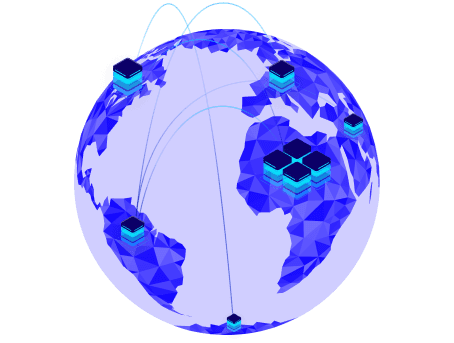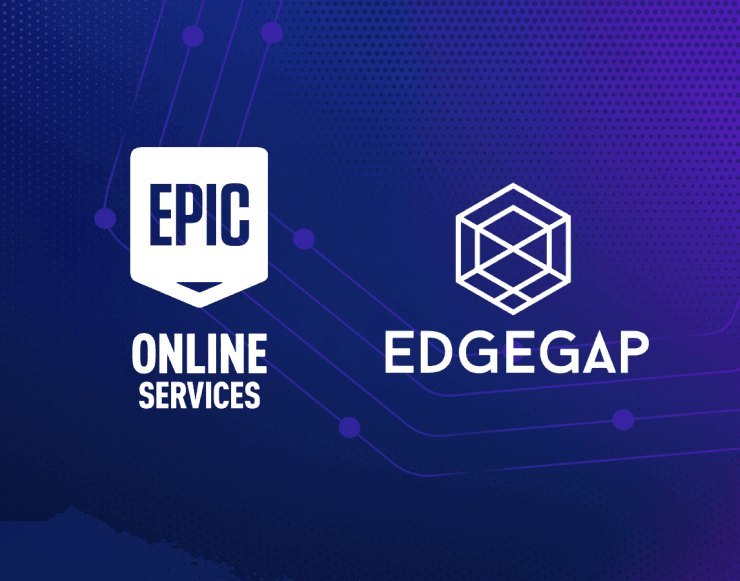
Automated Deployment & Orchestration on the World's Largest Public Edge Computing Infrastructure
Automated Deployment & Orchestration on the World's Largest Public Edge Computing Infrastructure
Automated Deployment & Orchestration on the World's Largest Public Edge Computing Infrastructure
For Flawless Real-Time Applications
Instant Response Time & Global Deployments in Seconds
Instant Response Time & Global Deployments in Seconds
Instant Response Time & Global Deployments in Seconds

+58%
Latency Reduction vs
Public Cloud

+58%
Latency Reduction vs
Public Cloud
550+
Locations
Worldwide
550+
Locations
Worldwide
∞
Scaling &
Concurrent Users
∞
Scaling &
Concurrent Users
~3s
Deployment to All Locations
~3s
Deployment to All Locations
0
Dev Ops Engineers to
Manage your Backend
0
Dev Ops Engineers to
Manage your Backend
99.99%
Availability
99.99%
Availability
Automated Deployment & Orchestration on the World's Largest Public Edge Computing Infrastructure
Instant Global Distribution

How We Make It Possible



Automated
Automated
Distributed
Distributed
Edgegap’s patented technology instantly deploys your instances to our global network, on-demand, and launches them just-in-time; only when and where needed
Edgegap’s patented technology instantly deploys your instances to our global network, on-demand, and launches them just-in-time; only when and where needed
Edgegap handles any traffic volume through rapid-scaling orchestration across its 550+ locations and 17+ providers to ensures your instance is always online & nearest to users
Edgegap handles any traffic volume through rapid-scaling orchestration across its 550+ locations and 17+ providers to ensures your instance is always online & nearest to users
Combined, this allows Edgegap's platform delivers both
real-time response time, and a simple, fully-managed solution for devs - no ops required
Combined, this allows Edgegap's platform delivers both
real-time response time, and a simple, fully-managed solution for devs - no ops required
Trusted By
Connect to Content
Add layers or components to infinitely loop on your page.
Partners

Access the World's Most Distributed
Edge Computing Infrastructure




Deploy Globally
in Seconds
Instant
Response Time
Sub-3 seconds, on-demand deployment of instances, from applications to game servers, worldwide automatically; no ops required
Sub-3 seconds, on-demand deployment of instances, from applications to game servers, worldwide automatically; no ops required
Discover how avg. +50% response time for your application (vs public cloud) can transform your application
Discover how avg. +50% response time for your application (vs public cloud) can transform your application
Always Online: 99.99% Availability
Eliminate risks related to launch planning & server provisioning with automated, on-demand and instant rapid scaling across 17+ providers
Includes integrated DDoS attack protection for total security & peace of mind
Uptime
(Last 90 days)
API
100.00%
Console
100.00%
Overall uptime
100.00%
Last 24 hours
100.00%
Last 7 days
100.00%
Last 30 days
100.00%
Last 90 days
Compatible
Compatible
Compatible
Compatible
Enable edge computing for any applications running in a container.
Bring your container and let Edgegap manage its lifecycle
Enable edge computing for any applications running in a container.
Bring your container and let Edgegap manage its lifecycle
Enable edge computing for any applications running in a container.
Bring your container and let Edgegap manage its lifecycle
Enable edge computing for any applications running in a container.
Bring your container and let Edgegap manage its lifecycle

Python
import os
import requests
from dotenv import load_dotenv
from flask import Flask, request, jsonify
load_dotenv()
# Getting our settings from env
ARBITRIUM_TOKEN = os.getenv("ARBITRIUM_TOKEN")
APPLICATION = os.getenv("APPLICATION")
VERSION = os.getenv("VERSION")
app = Flask(__name__)
@app.route('/servers', methods=['POST'])
def start_server():
# How you access the user's IP is unimportant for us, but you will need it to create a deployment.
# Here the user sent its IP in the request to get the TODO application, along with its username.
# We will inject it into the environment variables of our deployment.
data = request.get_json()
ip = data.get("ip")
username = data.get("username")
headers = {
"Content-Type": "application/json",
"Authorization": ARBITRIUM_TOKEN
}
# Building request body from the API specifications (/v1/deploy)
deployment_request = {
# These are mandatory to create a deployment
"app_name": APPLICATION,
"version_name": VERSION,
"ip_list": [
ip
],
# These are not mandatory, but recommended
"env_vars": [
{
"key": "message",
"value": f"Welcome {username} to your personal TODO application!"
}
],
# Arbitrium will make a POST request to this URL once the deployment container is accessible.
"webhook_url": "https://your-api.com/webhooks"
}
# Sending the request to Arbitrium to create a deployment
response = requests.post("https://api.edgegap.com/v1/deploy", json=deployment_request, headers=headers)
# Getting the Request ID from our request
request_id = response.json().get("request_id")
# Sending the Request ID to our client. Not mandatory, but it can be helpful to retrieve the deployment.
return jsonify({"request_id": request_id}), 200
@app.route('/webhooks', methods=['POST'])
def webhook_route():
# Accessing the data we need to forward to our client.
data = request.get_json()
request_id = data.get("request_id")
# This is the URL that our client needs to connect to access the TODO application online.
# Port 3000 is the one we set in our Dockerfile and our version
connection_url = data.get("ports", {}).get("3000", {}).get("link")
connection_data = {
"request_id": request_id,
"connection_url": connection_url
}
# Notifying our client of the connection informations
requests.post("https://your-route-to-notify-user-client.com", json=connection_data)
return 204
if __name__ == '__main__':
app.run()Python
import os
import requests
from dotenv import load_dotenv
from flask import Flask, request, jsonify
load_dotenv()
# Getting our settings from env
ARBITRIUM_TOKEN = os.getenv("ARBITRIUM_TOKEN")
APPLICATION = os.getenv("APPLICATION")
VERSION = os.getenv("VERSION")
app = Flask(__name__)
@app.route('/servers', methods=['POST'])
def start_server():
# How you access the user's IP is unimportant for us, but you will need it to create a deployment.
# Here the user sent its IP in the request to get the TODO application, along with its username.
# We will inject it into the environment variables of our deployment.
data = request.get_json()
ip = data.get("ip")
username = data.get("username")
headers = {
"Content-Type": "application/json",
"Authorization": ARBITRIUM_TOKEN
}
# Building request body from the API specifications (/v1/deploy)
deployment_request = {
# These are mandatory to create a deployment
"app_name": APPLICATION,
"version_name": VERSION,
"ip_list": [
ip
],
# These are not mandatory, but recommended
"env_vars": [
{
"key": "message",
"value": f"Welcome {username} to your personal TODO application!"
}
],
# Arbitrium will make a POST request to this URL once the deployment container is accessible.
"webhook_url": "https://your-api.com/webhooks"
}
# Sending the request to Arbitrium to create a deployment
response = requests.post("https://api.edgegap.com/v1/deploy", json=deployment_request, headers=headers)
# Getting the Request ID from our request
request_id = response.json().get("request_id")
# Sending the Request ID to our client. Not mandatory, but it can be helpful to retrieve the deployment.
return jsonify({"request_id": request_id}), 200
@app.route('/webhooks', methods=['POST'])
def webhook_route():
# Accessing the data we need to forward to our client.
data = request.get_json()
request_id = data.get("request_id")
# This is the URL that our client needs to connect to access the TODO application online.
# Port 3000 is the one we set in our Dockerfile and our version
connection_url = data.get("ports", {}).get("3000", {}).get("link")
connection_data = {
"request_id": request_id,
"connection_url": connection_url
}
# Notifying our client of the connection informations
requests.post("https://your-route-to-notify-user-client.com", json=connection_data)
return 204
if __name__ == '__main__':
app.run()Low Code
Low Code
Integration in minutes!
No need to integrate libraries or learn a new product. Get your application up and running through a simple integration of sending a RESTFUL API call.

Configure & Tailor
Transparent access to your deployment and orchestration data through detailed reports allowing you to fine-tune to your exact needs
Transparent access to your deployment and orchestration data through detailed reports allowing you to fine-tune to your exact needs

Save Time & Resources
Save Time & Resources
Save Time & Resources
Latest News
Latest News

Product
Scale & Launch your Multiplayer with Epic Online Services & Edgegap
Epic Online Services & Edgegap are partnering to bring simplicity & performance to game server & hosting to all game devs, regardless of game engine. Learn more…
Product
Web Games Server Hosting
We’re excited to be expanding our support for WebGL / HTML5 web games with all-new video tutorials, samples and documentation….
Deep Dive
Launch the #1 Game in the World? Easy.
Edgegap reaches 14MM CCU in 60 minutes during its 2023 Annual Performance benchmark. Learn how our orchestration…
Product
Edgegap Launches Relay Network
Using the world's largest public edge computing infrastructure of 17+ providers across 615+ locations…

Product
Scale & Launch your Multiplayer with Epic Online Services & Edgegap
Epic Online Services & Edgegap are partnering to bring simplicity & performance to game server & hosting to all game devs, regardless of game engine. Learn more…
Product
Web Games Server Hosting
We’re excited to be expanding our support for WebGL / HTML5 web games with all-new video tutorials, samples and documentation….
Deep Dive
Launch the #1 Game in the World? Easy.
Edgegap reaches 14MM CCU in 60 minutes during its 2023 Annual Performance benchmark. Learn how our orchestration…
Product
Edgegap Launches Relay Network
Using the world's largest public edge computing infrastructure of 17+ providers across 615+ locations…

Company
Stay informed
Stay informed
Company
Stay informed
©2023 Edgegap. All rights reserved






































